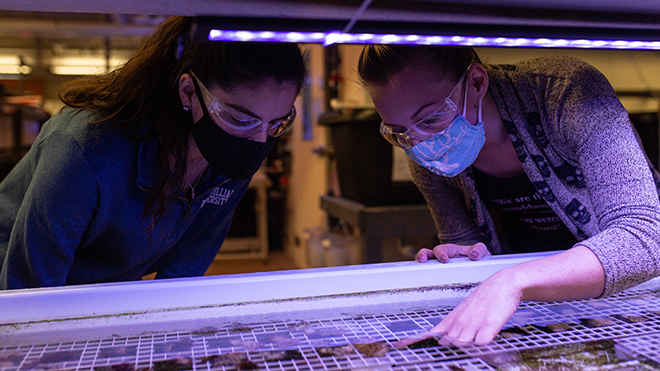Astrangia Things: Professor’s Research on Hibernating Coral Could Help Tropical Populations
Undergraduate students in Professor Koty Sharp’s Marine Biology lab work on all phases of Astrangia research, from running experiments to co-authoring publications.

BRISTOL, R.I. – For nearly a decade, Professor Koty Sharp and her team at Roger Williams University have been at the center of researching Astrangia poculata, helping it emerge as a valuable experimental model for studying corals worldwide. Now her latest study concerning the unique local coral has implications for helping tropical coral suffering from climate change and other environmental issues.
Sharp, an Associate Professor of Marine Biology at Roger Williams University and co-founder of the national Temperate Coral Research Group, has established her lab as a major research hub dedicated to utilizing Astrangia as an experimental system that can teach us more about coral health and resilience. At RWU, each year, Sharp mentors several undergraduates working on Astrangia-related research and co-leads an annual conference of the nation’s top coral scientists who have joined together to investigate the science of Astrangia.
As part of Sharp’s latest study, published in the journal Applied and Environmental Microbiology, she and her co-authors tapped into the temperate coral Astrangia (also known as the Northern Star Coral) – Rhode Island's state coral and the only hard coral found in New England – for answers about what happens to microbiomes when the coral enters a hibernating state of dormancy during the winter. Their model can be applied to other disturbances that tropical coral may experience, such as ocean warming, nutrient pollution, microplastics pollution, and more.
“This gives us the ability to learn more about how coral microbiomes change – and how they rebuild and recover from disturbance. What we learn from this study can help us develop informed strategies for conservation of corals in the tropics,” Sharp said.
As part of the study, Sharp and co-authors Anya Brown, an assistant professor at the University of California, Davis, and Amy Apprill, an associate scientist at the Woods Hole Oceanographic Institution, studied wild populations of Astrangia collected between October 2020 and March 2021 in Woods Hole, Massachusetts.
They discovered that while the coral is dormant, its microbiome sheds nutrient-loving and pathogen-associated microbes, while increasing microbes that may contribute nitrogen while the coral is no longer eating. This restructuring helps the corals maintain their microbial community structure, they said.
“If we understand more about this recovery period, it might help us understand what microbes may be responsible for recovering coral in warmer tropical systems,” Brown said.
Apprill noted that knowledge from this study “may help us develop probiotics or other microbial treatments for stressed tropical corals.”
The study, the first to demonstrate a persistent microbial community shift with dormancy in a marine animal, was funded by a WHOI Postdoctoral Scholar Award to Brown, as well as funding from the National Oceanic and Atmospheric Administration, National Science Foundation, and National Institutes of Health.
Undergrads Work on Next Research
In another soon-to-be-published study, Sharp’s students simulated winter conditions in the RWU Wet Lab, which triggered Astrangia colonies to enter dormancy. This paper will track the microbiome shifts during lab-simulated dormancy, and it will compare the students’ results in lab-based experiments to the results from the wild populations in the initial study. Sharp said, “The RWU students and our Wet Lab facilities made it possible to run this aquarium-based experiment. Further, the RWU student researchers design and build an aquarium system specific for their experimental needs; this is all part of the research training process for them – they designed it from scratch and ran it from start to finish.”

Each year, five to seven students work on Astrangia-related research in Sharp’s lab, one of the labs that operate in RWU’s Center for Economic and Environmental Development (CEED), which focuses on Blue Economy research, entrepreneurship, education and outreach, said Sharp, who serves as CEED’s interim director. She emphasized that a unique aspect of an RWU education is that undergraduates play a significant role in the research process. In all science labs, students are involved in every aspect of a research project, from running experiments to co-authoring publications and presenting at conferences.
“That’s a great experience for them,” Sharp said. “Our students get skills and expertise that they can build on, and they can get exciting positions related to the Blue Economy, marine research, aquaculture, and more – or demonstrate already strong research experience when applying to graduate and postdoctoral programs.”
Undergraduate students also benefit from collaborations with researchers from other institutions, including UC Davis and WHOI, Sharp noted. “The faculty at RWU are doing work that’s plugged into bigger networks,” she said. “RWU faculty are deeply connected to the national and international research community, and so are our students.”